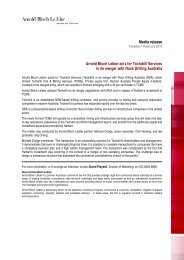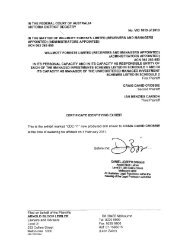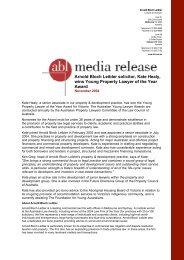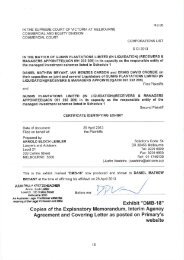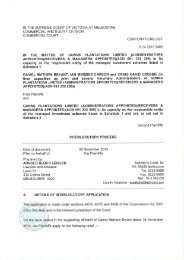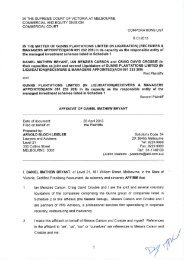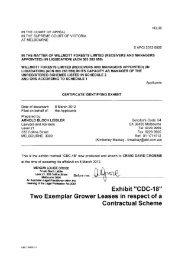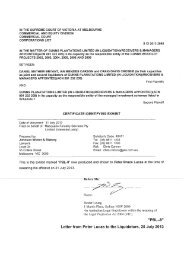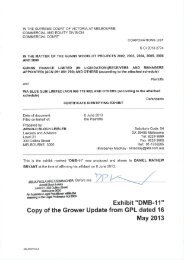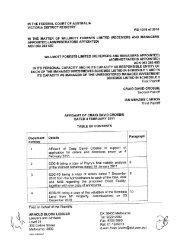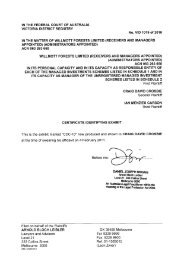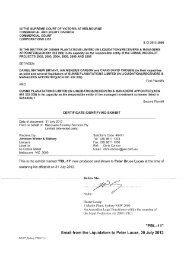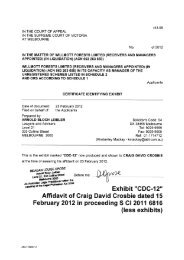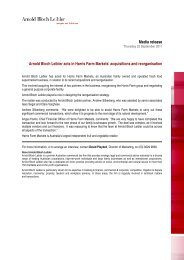Competition Litigation 2012 - Arnold Bloch Leibler
Competition Litigation 2012 - Arnold Bloch Leibler
Competition Litigation 2012 - Arnold Bloch Leibler
- No tags were found...
You also want an ePaper? Increase the reach of your titles
YUMPU automatically turns print PDFs into web optimized ePapers that Google loves.
<strong>Arnold</strong> <strong>Bloch</strong> <strong>Leibler</strong>AustraliaAustraliaThe court also has a general discretion to exclude evidence that is,for example, unfairly prejudicial (sections 135–137).4.4 What are the rules on disclosure? What, if any,documents can be obtained: (i) before proceedings havebegun; (ii) during proceedings from the other party; and(iii) from third parties (including competition authorities)?During a proceeding, each party must ordinarily undertake“discovery”. This involves making available to the other parties alldocuments in a party’s possession, custody or power that arerelevant to the issues in the proceeding (Federal Court Rules, Part20). Documents subject to client legal privilege or “withoutprejudice” privilege are excluded.Persons who are not parties to the proceeding may be compelled toproduce documents pursuant to a subpoena. A subpoena must not beissued without leave of the court (Rule 24.01). Less commonly, a thirdparty may be ordered to make “non-party discovery” (Rule 20.23).Before proceedings have begun, a person may apply to the FederalCourt for an order for “preliminary discovery” by another person.This may be sought to (i) ascertain the identity of a prospectivedefendant, or (ii) obtain information to decide whether tocommence proceedings (Division 7.3).There are protections, however, for confidential information givento the ACCC about cartel conduct (“protected cartel information”).The ACCC cannot be required to disclose such information:by preliminary or non-party discovery (Act, section 157C); orotherwise (for example, by subpoena) except with the court’sleave (section 157B).If the information was given to the ACCC by an informant, thecourt must take into account that disclosure may discourageinformants in the future.In some circumstances, documents may be obtained from theACCC under the Freedom of Information Act 1982 (Cth).4.5 Can witnesses be forced to appear? To what extent, ifany, is cross-examination of witnesses possible?Generally, a witness may be compelled by subpoena to giveevidence in court (Federal Court Rules Rule 24.12). An ACCCofficial cannot, however, be required to disclose “protected cartelinformation” except by leave of the court (see question 4.4).A party is entitled to cross-examine a witness who is called to giveevidence by another party. If the court grants leave, a party mayalso cross-examine a witness who the party called if the witnessgives evidence that is unfavourable to the party, if the witness doesnot make a genuine attempt to give evidence or if the witness hasmade a prior inconsistent statement (Evidence Act, section 38).4.6 Does an infringement decision by a national orinternational competition authority, or an authority fromanother country, have probative value as to liability andenable claimants to pursue follow-on claims for damagesin the courts?4.7 How would courts deal with issues of commercialconfidentiality that may arise in competition proceedings?A party cannot refuse to discover documents merely because theyare confidential. The parties must not, however, use documentsproduced compulsorily for any purpose other than the proceeding.In practice, the lawyers for one party are often given access to theconfidential documents of another party on condition that theyundertake not to disclose the documents to their client.See also question 4.4 regarding “protected cartel information”.5 Justification / Defences5.1 Is a defence of justification/public interest available?There is no general defence of justification or public interest. Thereare, however, important exceptions and an authorisation process.ExceptionsThere are exceptions to most prohibitions in Part IV of the Act,including for:(a) joint ventures (for cartel conduct and exclusionaryprovisions);(b) intellectual property rights;(c) compliance with official standards;(d) the protection of goodwill after the sale of a business; and(e) employment/partnership conditions and post-employment/partnership restrictions.There is also a defence for secondary boycotts with a dominantpurpose relating to working conditions, environmental protection orconsumer protection (section 45DD).AuthorisationThe ACCC can authorise conduct that would otherwise breach PartIV (except for misuse of market power and predatory pricing) if theconduct would result in a public benefit that outweighs theanticompetitive detriment (sections 88 and 90). A party may applyto the Tribunal for review of the ACCC’s decision (except formerger/acquisition decisions) (section 101).The Tribunal can also authorise acquisitions on the basis of publicinterest (see question 1.4).5.2 Is the “passing on defence” available and do indirectpurchasers have legal standing to sue?These issues have not yet been decided by the courts. Becausedamages awards under section 82 of the Act are compensatory, it isarguable that a plaintiff’s damages award should be reduced by theamount of any loss “passed on” to subsequent purchasers, and thatsubsequent purchasers are entitled to damages if they can provecausation and loss.6 Timing18No, but the ACCC is able to authorise conduct that would otherwisebreach the Act (see question 5.1). The Tribunal is also able toauthorise acquisitions that would otherwise breach the Act (seequestion 1.4).If a court finds that a person breached Part IV of the Act, a findingof fact by that court is prima facie evidence in subsequentproceedings (section 83).6.1 Is there a limitation period for bringing a claim for breachof competition law, and if so how long is it and when doesit start to run?There are different limitation periods for differentpenalties/remedies:(a) The ACCC must bring an action for a (civil) pecuniarypenalty within six years of the contravention (section 77(2)).WWW.ICLG.CO.UKICLG TO: COMPETITION LITIGATION <strong>2012</strong>© Published and reproduced with kind permission by Global Legal Group Ltd, London



